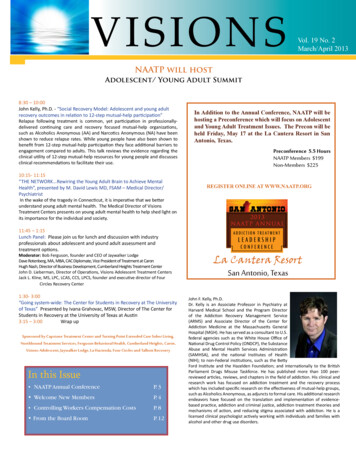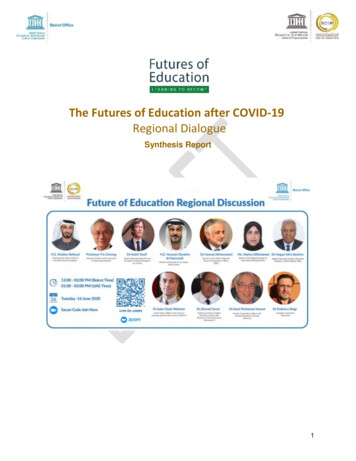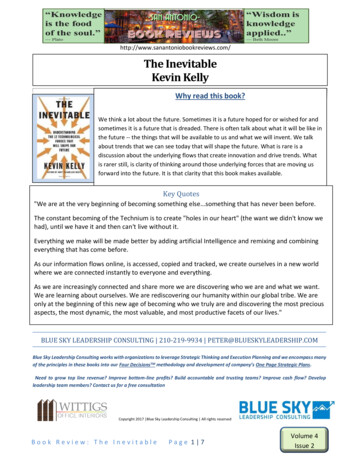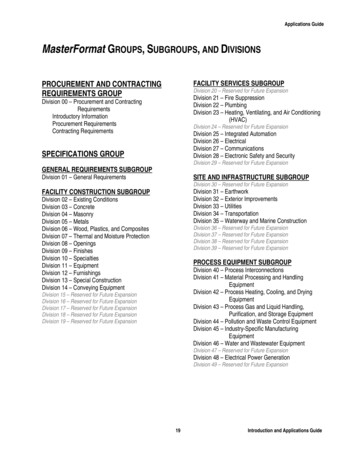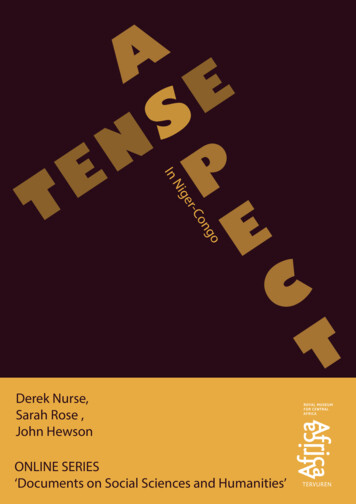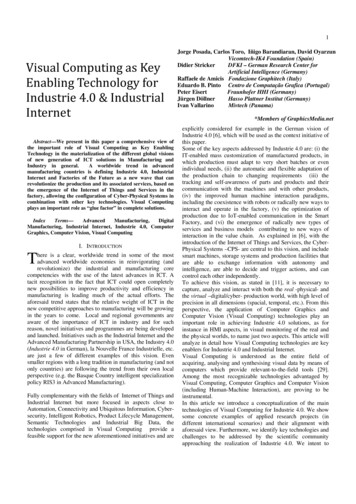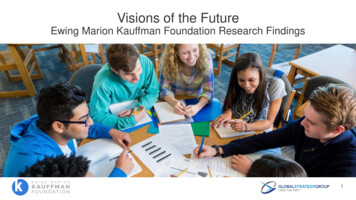
Transcription
Visions of the FutureEwing Marion Kauffman Foundation Research Findings1
State of Education
Most adults had a positive high school experienceHow would you rate the high school you attended overall?AAdults28White parents28Non-white parents25Employers28BC45DF2042622435222.9142.873 32.8642712GPA532.983
Adults felt prepared for college, less so when it came to the workforceor real worldThinking about your own high school education, regardless of whether you chose to pursue these things, pleaseindicate how well you think each description fit you upon your graduation.AdultsVery/Somewhat wellCollege-ready 2538Prepared with the skills tosucceed in college 25641Prepared with the skills to join the22workforce right out of high school439Prepared with the skills needed to 19succeed in the real world63519527531Prepared for life and its everyday17challenges21434Career-ready 18Prepared with the skills to start a11businessNot too/Not at all well326ParentsEmployers2011 27 40 18 9 44 34 14 71713 31 44 15 8 43 40 13 314 28 41 18 12 42 36 15 615 25 34 21 15 28 39 22 112619 27 29 21 19 30 37 21 112619 24 39 18 18 36 40 15 839 15 26 22 33 28 26 22 224
Most adults cannot connect what they learned in high school to theircurrent job; however, employers have a more positive outlook[If employed] Does your current job actually relate to things you learned in high school?YesNoAdults4159White collar adults4852Blue collar adults3961Service adults3070Parents4951Employers54465
Adults recognize value in math skills but at the same time feel that theywere not taught how to translate that into real world skills like taxes andfinancesThinking about your own high school experience, what is the most important skill that your high school did teachyou that prepared you for success later in life?Adults:Employers:Thinking about your own high school experience, what skill did your high school not teach you that you believewould have better prepared you for later in life?Adults:Employers:6
Like their own experience, most adults see students as being preparedfor college with less of a focus on real world or workforceRegardless of whether students choose to pursue these things, please indicate how well you think each one fitsstudents who graduate high school in the United States?AdultsVery/Somewhat wellCollege-ready 2244Prepared with the skills tosucceed in college 2127Prepared with the skills needed tosucceed in the real world 1429Prepared for life and its everydaychallenges 12Prepared with the skills to start abusiness 12640Career-ready 163518266Employers630 43 14 634 48 15 317526 50 19 342 43 11 41218 42 28 1036 32 21 107331723 29 27 1525 33 28 148301923 34 24 1424 35 28 121820 37 27 1530 32 24 142919 21 30 2424 35 28 12296819951Prepared with the skills to join the16workforce right out of high schoolParentsNot too/Not at all well337
Comparatively speaking, students today are seen as even lessprepared to enter the workforce than in the pastPercent saying students graduating high school in different time periods were/are/will be extremely or somewhatprepared to succeed in the workforceEmployers 8982Adults 72Parents 70767166706657In the 1980sToday64585249In the 1950s69In ten yearsIn twenty years8
Students expect that their schools will prepare them for college, whichmost plan to attend; however, almost none feel prepared to start acareer after high school[If student] Regardless of whether you plan on doing these things, thinking about your own high school education,please indicate how well you think each description will fit you upon your graduation.Very/Somewhat wellPrepared with the skills to succeed in college39College-ready36Prepared for life and its everyday challenges26Prepared with the skills to join the workforce right out of HS20Prepared with the skills needed to succeed in the real world20Career-ready15Prepared with the skills to start a business10Not too/Not at all well4534524440631Almost all students plan on attending college (62% plan on attending afour-year college or university, 21% plan on attending a two-year college).2951341216194377204452315381213299
Similar to past generations, today’s students see a lack of connectionbetween subject matter skills they were taught and life skills – techskills a notable exceptionSkills high schools are teaching you/your child that will prepare them for success later in lifeStudents:High School Parents:What skills are high schools not teaching you/your child that will prepare them for success later in life?Students:High School Parents:10
State of Skill Provision
Across groups, majorities believe we should prioritize real world skillsover subject matter education in high schoolsWhich of the following comes closest to your opinion about high school preparation?High schools should focus ondeveloping real world skillsHigh schools should focus on thefundamentals of subject matterexpertise like reading and writingAdults7327White parents7921Non-white parents7030White collar employers6634Blue collar employers7129Service employers7327Students811912
For example, all audiences overwhelmingly agree there would be moreuse in learning about taxes than the Pythagorean theorem in highschoolWhat is more useful to learn in a high school classroom these days?How to file taxesThe Pythagorean 21813
The purpose of a high school degree is to prepare you for success inthe real world, not the next iteration of schoolWhich of the following comes closest to your opinion about the purpose of a high school degree?A high school degree should primarily focuson providing students with the skills needed tosucceed in the real world.A high school degree should primarily focus onproviding students with the skills needed tosucceed in higher education.Adults7426White parents7723Non-white parents6634White collar employers6535Blue collar employers6040Service employers6832Students643614
Employers more likely to value self-management skills – particularlytime management, more than subject matter skills like reading andwritingPlease indicate how important you believe each skill is for success in the workforce.% Very important for on-whiteWhiteNon-whiteWhite collarBlue collarServiceReading and 81Problem-solving8081798681778074Judgment and decision making7881788275777777Time 1738274Critical 6615
General sense of under-teaching of critical soft skills– too much focuson test taking and college preparedness examsDifference between skills needed for success and those focused on by educatorsAdults:White parents:Non-white parents:GapReading and ent and decision making8045Time management7846Self-managementCritical thinkingPerseverance control/express emotion32Financial literacy37Interpersonal skills39FlexibilityAbility on exams like SAT/ACT 3025655332-3037-278542% Believe educators arefocusing on it-3870-33654385% Believe it’s very importantfor success in the workforce51 5237-2467-22-2267-1467-16 3370 53 3125676553-26824545 42734565-19-166643-9-107450-15-217364 6-3367 41 28 41-326943-2581774379-25-147659Gap 5817943676945493771Ability on statewide tests 28-33-35658467676640-18-39688659-2969Tolerating unpleasant emotion 29-26-22724081-347450-4-307640Gap8516
Employers more likely than average adult to see an over focus onsubject matter at the cost of self-management and emotionalintelligenceDifference between skills needed for success and those focused on by educatorsWhite collar employers:Blue collar employers:Service worker employers:GapReading and t and decision making59Time management65Self-management56Critical thinkingPerseveranceAbility on exams like SAT/ACT2565-57551-1143 4144 432565% Believe it’s very importantfor success in the workforce77 377-1357-1377 7-10-2472-12570597663-177440-11723625-107060 3385-86646 31774556-1574817470-1066 158461-31 250-15% Believe educators arefocusing on it8051-585-118056 10807763-13834554-22804075-12688469-177339Ability on statewide tests-12595774-1258Flexibility776454Interpersonal skills-186151Financial literacy777349 control/express emotion-57551Tolerating unpleasant emotion777363 14-1178GapGap 32824565 468517
Students identify the same shortfalls in the provision of selfmanagement skills– they also believe there is too much focus on abilityto take testsDifference between skills needed for success and those focused on by educatorsNon-white students:White studentsGapReading and t and decision making8550Critical thinking70Perseverance47Tolerating unpleasant emotion control/express emotion36Financial literacy36-3364-2837262582354555653775% Believe educators arefocusing on it85-215840-256544-166045 5079-3364-2929-196931-2766-216634 56 44783125-77650 467735% Believe it’s very importantfor success in the workforce4555-9-197169-15-227752 1-11-2869Interpersonal skills77-21787131 9-338254Self-managementAbility on statewide tests8649Time managementAbility on exams like SAT/ACT91Gap65758518
Across key groups, people see HS degree with an additional credentialas more likely to lead to financial security, marketability, and problemsolving skills compared to good test scoresPlease indicate how financially secure you think each of these types of people, on average, are today?VerySomeone with a high school degree and anadditional credential or employer recognized skillSomeone who had high test scores in HSSomewhatAdultsDon’t know199Not that5437Not at all1772916StudentsEmployersSecure Not secure Secure Not secure374 1982 15947 4162 28Please indicate how attractive to employers you think each of these types of people, on average, are today?VerySomeone with a high school degree and anadditional credential or employer recognized skill36Someone who had high test scores in HS19SomewhatAdultsDon’t knowNot thatNot at all4938952689StudentsEmployersAttractive Not attract. Attractive Not attract.89 891 758 3672 24Please indicate how effective of a problem solver you think each of these types of people, on average, are today?VerySomeone with a high school degree and anadditional credential or employer recognized skill28Someone who had high test scores in HS20SomewhatAdultsDon’t knowNot that52Not at all7103StudentsEmployersEffective Not effect. Effective Not effect.81 1288 919431022567 2475 20
The State of Work
Even white collar employers are open to hiring someone with just ahigh school degreeWould you be open to Directionhiring someoneof Pennsylvaniawith just a high school degree?Overall EmployersYes86Small employers95Medium employers81Large employers86Public sector employer79Private sector employer88White collar employers84Blue collar employers90Service employers83Not sureNo867757669Have hired someonewith just a HS degree80%486%1278%778%1672%583%1076%490%879%21
When hiring, employers are looking for industry experience andtechnical training even more than degreesPlease indicate how influential each attribute is in your decision to hire an applicant or not.% Very or somewhat influentialEmployersOverallCompany sizeSmall Medium LargeSectorPublic PrivateType of job hiring forWhite collar Blue collar ServiceThey have completed internships in your industry928993949393949194They have technical certifications888489908490899187They have a high school degree868188878486858787They have a college degree847587858683877881They have completed internships827186858583858376They held a leadership position in school or anextracurricular organization776480827978788177They have started their own business766279807677757980They had a high GPA in high school746280757974757569They were involved in extracurricular activities (clubs,sports, student government, etc.) in high school726275757372737175They have no paid work experience63646164706161657122
Employers overwhelmingly prioritize real work experience in their hiringprocesses – something they sometimes find challenging – as well as anability to grow[If Employer] What is the most important thing you look for when hiring employees?“The most important thing I look for is theability to communicate well, someonewho is friendly and approachable, andsomeone who is willing to learn.”“Real world experience, notspecifically in our field, but beingable to work on a team and takeinstructions is key.”“A strong work ethic and selfmanagement abilities.”“A broad set of skills that we can use in ourworkplace alongside a willingness to adaptand change.”[If Employer] What is the most difficult to find skill that you look for when hiring employees?“Leadership. Many employees tend to'stay in line' and not challenge thestatus quo, which in this particularindustry is actually helpful andencouraged.”“Experience – across the board.”“A dedicated worker. There are manygood workers that are not even close todedicated or motivated to do what they’redoing.”“People with the appropriate certificationsand experience for my industry.”23
Still, there is a strong sense, especially among students, that havingonly a high school education will hold you back professionallyDo you think someone with only a high school degree will be held back from success in life by their ployers4456Do you think someone with only a college degree will be held back from success in life by their ployers6634High school students believe it is equally likely that flying cars will be widelyavailable to the general public in ten years (49% more likely), as thatsomeone will be elected President with only a high school degree (51%).24
Employers more likely than others to value experience, but think bestthing a student can do is get a HS degree with credentialPlease indicate how important, currently, you think it is for students to do each of these things.AdultsEmployersStudentsWhite parentsNon-white parentsTo receive at least a high school diploma8378877884To receive a high school diploma and an additionalcredential or employer recognized skill5768585853To have a mentor guiding them as they explorecareer pathsTo have participated in internships or externshipsin college51565048573646403247To receive an Associate's degree or vocationaldegree3851344241To receive a four-year college degree3147503446To have participated in internships or externshipsin high school3040352345To have worked a job for wages in high school3250303035To have participated in a high quality prekindergarten program2435222328% Very important currently25
While employers are most likely to see value in a HS diploma withadditional credential today, they are also most likely to see it decliningin valueValue of different types of learning currently v. in ten yearsEmployers:Adults:To receive at least a high school diploma82To receive a high school diploma and an additionalcredential or employer recognized skill57To have a mentor guiding them as they explorecareer paths48To have participated in internships or externshipsin college36To receive an Associate's degree or vocationaldegree31To have participated in internships or externshipsin high school30To have worked a job for wages in high school241075–59595146–39493840–33302850% Very important currently70901043–5034301550% Very important in ten 040–51492756564747857868524032To have participated in a high quality prekindergarten program–4238To receive a four-year college degree83Students:–52––3531223050709026
Race drives parents’ attitudes toward the future of a HS degree; nonwhite parents see it decreasing in value while white parents optimistic –likely due to their current dissatisfaction with college degreesValue of different types of learning currently v. in ten yearsWhite Parents:Non-white Parents:To receive at least a high school diploma78To receive a high school diploma and an additionalcredential or employer recognized skill58To have a mentor guiding them as they explorecareer paths47To have participated in internships or externshipsin college32402310–4840–41433328% Very important currently544634305747–2850709010% Very important in ten years8466494030To have participated in a high quality prekindergarten program534023To have worked a job for wages in high school614234To have participated in internships or externshipsin high school7038To receive an Associate's degree or vocationaldegreeTo receive a four-year college degree83–49–45–35353050709027
The Future of Work
Across groups, people are optimistic about the changing role oftechnology and the future of workWhich of the following comes closest to your opinion about the future of work?AdultsEvolving technology will create moreopportunities, industries, and jobs thatwe have not begun to imagine yet.49Evolving technology will decrease thenumber of opportunities and jobsavailable as technology and automationDon’t knowwill replace the jobs that currently exist.1437White parents4940Non-white parents531037White collar employers57439Blue collar employers56Service employers58537Students5412341140429
Most anticipate increased work in STEM-related fields, but confidencein other areas is less pronounced—students even more likely to seedemand for tech jobsFor each profession, please indicate whether or not you think it will be in more or less demand in ten years.AdultsAbout thesame/Don’t knowMuch/Somewhat more in demandComputer science and technology jobs62Health care56Engineering and applied mathematics3831Social work and therapy3832Teaching and p and start ups28Childcare28Financial services27Food service and hospitality25Manufacturing22Communications and journalism19Retail11Librarians, curators, and historians9Much/Somewhat less in demand10235453 25 228338 31 725538 31 5828 25 8632 30 6534 28 4729 36 51232 26 81024 30 12920 24 10332226 26 17421817 26 184116 11 40 30467 8 69 19 4
Most recognize the changing future of work will have more of an impacton high school students; notably, non-white parents see more of apersonal impact than white parentsHow much of an impact do you think the changing future of work will have on you, personally?Major impactNon-white parents56Employers54Students53White parents39Adults35Don’t knowMinor impactNo impact at all374378294434313598229How much of an impact do you think the changing future of work will have on students who are in high school now?Major impactNon-white parents73Adults71Employers69White parents64Minor impactDon’t knowNo impact at all18167102725232 29231
There is a substantial sense of flux in workforce needs; nearly one infive adults believe their job won’t exist in 20 yearsDo you think your current job title will exist in 20 years?YesNoAdults8218Parents8416Employers8911Do you think the job you will have in 20 years has been invented yet?Students742632
The Future of Education
Most groups are open to change in the education system—regardlessof toneWe need to niaway we approach high school education.Strongly agreeGradual - Adults 34Don’t knowSomewhat agree41Disagree1411Radical - Adults34Gradual - Employers40Radical - Employers45Gradual - White Parents33Radical - White Parents29Gradual - Non-white Parents43Radical - Non-white Parents41Gradual - White Students25Radical - White Students31Gradual - Non-white Students3545Radical - Non-white 63682310111191534
Across key groups, most want more of a focus on a “real-world” skillsIn just a few words, if you could change one thing about how we teach high school students, what would it be?Adults:Parents:Employers:Students:35
In addition to traditional reforms, key groups would like to see life skillsand real world opportunities prioritized– students want tech skills tocontinue to be a priorityMost important priorities for educational leadership to better prepare students for success in the workforceTop/Major priorityTeaching life skills, like financial literacy andorganization61Training and attracting higher quality teachers50Getting more funding for schools48Connecting students to real world learningopportunities like internships48Focusing on building character traits andinterpersonal skills44Offering students credit for real world learningopportunities like internships42Promoting STEM and technology skills so studentsare prepared to work with evolving technology42Connecting students to job shadowing programswhere they can learn about companies where theymay be able to work41Encouraging students to select a career path orindustry so they can get a head start on their career37AdultsDon’t knowParents EmployersStudentsNot important5 461 32 452 37 1067 27 3750 36 950 38 1048 38 81455 32 947 36 1549 34 12645 45 747 40 1048 43 55845 45 744 43 1142 45 86845 44 844 40 1447 39 9942 44 948 39 1250 38 6746 44 638 45 1544 46 5303632764244344418466364461341 42 13 38 43 1740 42 13
Raising academic standards and competitiveness are seen as far lessimportant steps for real world successLess important priorities for educational leadership to better prepare students for success in the workforceAdultsDon’t knowTop/Major priorityCreating opportunities for students to learn moreabout entrepreneurship34Closing the gap in graduation rates between whitestudents and students of color34Allowing students to begin taking college coursesfor credit32Training and hiring diverse teachers who share thebackgrounds of their students3040Developing specialized institutions or academiesso students can focus on their studies2845Raising the standards for graduation or completinga grade26Increasing the number of students who receivegood grades so that they can be competitive forcollege23Increasing school-wide test scores and thecompetitiveness of schools1846732124768838840Parents EmployersStudentsNot important81338 47 1134 46 1834 48 122236 33 2138 39 1932 32 221537 45 1437 43 1944 44 92232 42 2235 42 2226 42 251929 49 1832 44 2236 43 132823 41 3033 41 2322 34 352925 39 2930 36 3222 37 314019 34 4229 35 3415 29 4837339
State of Entrepreneurship Education
Few, including the students themselves, believe high school preparesstudents for entrepreneurship; a lack of technical and personal skillsare more likely to be seen as their biggest obstacle – more than capitalHow well does a high school education prepare students to start their own businesses?Very wellAdults11Students19Somewhat wellNot at all well29602952[If don’t think 18-25 year olds are equipped to start a business] Which of the following do you think is the mostsignificant reason that 18-25 year olds, on average, are not equipped to start a successful business?They don’t have access to the fundsneeded to start a businessAdults44They don’t have the personalskills/technical skills to manage a business6639
Survey MethodologyGlobal Strategy Group conducted three online surveys in June 2019. One survey of 1,015 adults nationwide with an oversample of parents for a total of 516 parentsbetween June 13th and 21st, 2019. One survey of 510 high school students nationwide, defined as 13 to 18 year olds eithercurrently in or entering high school in the upcoming school year, between June 15th and 24th, 2019. One survey of 501 employers nationwide, defined as those responsible for hiring decisions,between June 17th and 20th, 2019.Special care was taken to ensure that the demographics of the various populations are properlyrepresented by the survey’s respondents.40
Visions of the Future Ewing Marion Kauffman Foundation Research Findings 1. State of Education. GPA 2.91 2.87 . Thinking about your own high school education, regardless of whether you chose to pursue these things, please . Most recognize the changing

